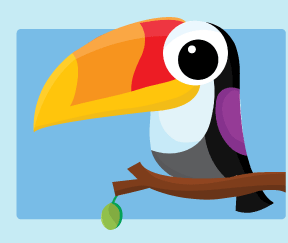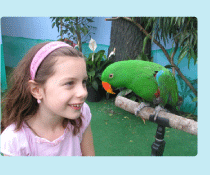 |
||
|
|
||
|
 When you visit the National Aviary and participate in a feeding or watch a bird show, you’ll see birds flying on cue, taking food from the hand, or being handled. Training those behaviors requires patience and persistence, and one of the most frequent questions we hear is, “How did you get the birds to do that?” or, “Why don’t they fly away instead of coming to you?” The answer has to do with the way we train them. When you visit the National Aviary and participate in a feeding or watch a bird show, you’ll see birds flying on cue, taking food from the hand, or being handled. Training those behaviors requires patience and persistence, and one of the most frequent questions we hear is, “How did you get the birds to do that?” or, “Why don’t they fly away instead of coming to you?” The answer has to do with the way we train them.
A rewarding experience for the birds.The National Aviary trains birds using positive reinforcement techniques. Positive reinforcement training means that whenever a bird does something that we want them to do, they get a treat or something that they really like. That treat might be a sunflower seed or nut for a parrot, a grape for a toucan, a piece of mouse for an owl, or a fish for an Inca tern. Some birds, like our African penguins, will complete behaviors just for the extra attention — they are motivated by a scratch on the head!The most important aspect of this kind of training is that it’s positive. We work hard to build trusting relationships with our birds so that they look forward to interacting with us. back to topWe take our time.We train our birds in small steps. If we want an owl to fly from a stump on stage to a perch at the back of the National Aviary’s Rose Garden, we don’t ask it to fly the full distance the first time. Instead, we’ll move the stump close to the perch and ask the owl to make small hops back and forth. As the owl becomes confident with small hops, we scoot the stump backwards and increase the distance little by little. Over time the owl will learn to fly the entire length of the garden.back to topAn enrichment for the birds and an inspiration for our visitors. Training birds enables us to offer visitors an up-close, interactive experience with rare and beautiful birds that most people would never come in contact with otherwise. We believe that if you have the chance to connect with a bird emotionally (by feeding it, having it sit on your hand, seeing it fly low over your head, etc.) you’re more likely to want to do something to help protect it in the wild. Training birds enables us to offer visitors an up-close, interactive experience with rare and beautiful birds that most people would never come in contact with otherwise. We believe that if you have the chance to connect with a bird emotionally (by feeding it, having it sit on your hand, seeing it fly low over your head, etc.) you’re more likely to want to do something to help protect it in the wild.
Training makes it possible for our staff to directly handle the birds, and this in turn makes it possible for us to take better care of them. We are able to get accurate daily weights, we can monitor and assess them more easily because they allow us to get close, and the regular interaction with humans makes the birds more relaxed when we move through their exhibit areas. Training is also enriching for our birds! It keeps them active by requiring them to think and react to the cues and reinforcements that they are being offered. It encourages them to try new things and builds their confidence through positive human interaction. back to topBecoming a zoo animal trainer.In order to become an animal trainer in a zoo, you need to earn a college degree in a biology or environmental education related field. Our trainers have degrees in zoology, animal science, wildlife management, psychology and education to name a few. Trainers who have degrees in other, non-animal disciplines had experience working with animals in other settings before coming to the National Aviary.It is also important to gain early experience working with animals. Many of our trainers started out in teenage volunteer programs at zoos while in high school, and completed multiple internships while in college. In fact, many of our hardest working interns are now full-time employees at the National Aviary. The most important aspect of becoming an animal trainer is to have experienced mentors. Experienced National Aviary trainers spend time working with and guiding less experienced trainers. Most of our trainers have attended professional animal training conferences, seminars and workshops. back to topTo learn more about training animals:1. Come to our indoor free-flight bird show in cooler months or our outdoor free-flight bird show in warmer months. See our birds performing their trained natural behaviors and stick around after to talk to our training staff.
2. Children, teens and adults age 12 and up can sign up for a special program to experience what it is like to be a trainer at the National Aviary. 
|




